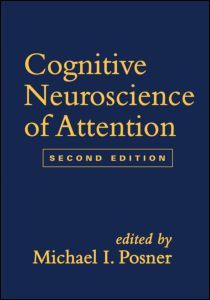Description
Cognitive Neuroscience of Attention, Second Edition (2nd Ed.)
Coordinator: Posner Michael I.
Language: English
Subject for Cognitive Neuroscience of Attention, Second Edition:
514 p. · 17.8x25.4 cm · Paperback
Description
/li>Contents
/li>Readership
/li>Biography
/li>
This authoritative reference provides a comprehensive examination of the nature and functions of attention and its relationship to broader cognitive processes. The editor and contributors are leading experts who review the breadth of current knowledge, including behavioral, neuroimaging, cellular, and genetic studies, as well as developmental and clinical research. Chapters are brief yet substantive, offering clear presentations of cutting-edge concepts, methods, and findings. The book addresses the role of attention deficits in psychological disorders and normal aging and considers the implications for intervention and prevention. It includes 85 illustrations. New to This Edition *Significant updates and many new chapters reflecting major advances in the field. *Important breakthroughs in neuroimaging and cognitive modeling. *Chapters on the development of emotion regulation and temperament. *Expanded section on disorders, including up-to-date coverage of ADHD as well as chapters on psychopathy and autism. *Chapters on cognitive training and rehabilitation.
1. Progress in Attention Research, Michael I. PosnerI. Cognitive Science2. On the Modes and Domains of Attention, Raymond M. Klein and Michael A. Lawrence
3. Boolean Map Approach to Visual Attention, Liqiang Huang and Harold Pashler4. Symbolic and Connectionist Models of Attention, Hongbin Wang, Xun Liu, and Jin Fan5. Models of Visual Search: From Abstract Function to Biological Constraint, Glyn W. Humphreys and Eirini Mavritsaki6. Inhibitory Mechanisms in the Attentional Networks: A Multidisciplinary Approach, Luis J. Fuentes, Ana B. Vivas, Linda K. Langley, Qi Chen, and Carmen González-Salinas7. Dynamic Cognitive Control and Frontal–Cingulate Interactions, Cameron S. Carter and Marie K. Krug8. Discrete Resource Limits in Attention and Working Memory, Edward F. Ester, Edward K. Vogel, and Edward AwhII. Imaging9. Two Attentional Networks: Identification and Function within a Larger Cognitive Architecture, Gordon L. Shulman and Maurizio Corbetta10. Clutter and Attention in Multivoxel Functional Magnetic Resonance Imaging, Leila Reddy and Nancy Kanwisher11. A Frontoparietal Attention System in Human and Monkey Brain: Constructing and Assembling the Fragments of Thought and Behavior, John Duncan and Tom Manly12. Nervous Anticipation: Top-Down Biasing across Space and Time, Anna C. Nobre, Gustavo Rohenkohl, and Mark G. Stokes13. Microstructural Properties of White Matter Tracts Are Linked to the Efficiency of Specific Attention Networks, Bruce D. McCandliss14. Tracking the Allocation of Attention in Visual Scenes with Steady-State Evoked Potentials, Søren K. Andersen, Matthias M. Müller, and Steven A. HillyardIII. Neuroscience15. Using Nonhuman Primates to Study the Micro- and Macro-Dynamics of Neural Mechanisms of Attention, Geoffrey F. Woodman and Charles E. Schroeder16. Top-Down Control of Attention by Rhythmic Neural Computations, Earl K. Miller and Timothy J. Buschman17. Neural Mechanisms of Saccade Target Selection: Evidence for a Stage Theory of Attention and Action, Jeffrey D. Schall and Kirk G. Thompson18. Neural Circuits Controlling Visual Attention, Tirin Moore, Brittany Burrows, Katherine M. Armstrong, Robert J. Schafer, and Mindy H. Chang
19. Attentional Modulation of the Firing Patterns of Hippocampal Neurons, DavidClayton Rowland and Clifford George KentrosIV. Development20. Resting State Studies on the Development of Control Systems, Damien A. Fair, Nico U.F. Dosenbach, Steven E. Petersen, and Bradley L. Schlaggar21. Development of Error Detection, Andrea Berger, Chananel Buchman, and Tamar Green-Bleier22. Attentional Control and Emotion Regulation in Early Development, Martha Ann Bell and Susan D. Calkins23. Development of Temperament and Attention: Behavioral Genetic Approaches, Kirby Deater-Deckard and Zhe WangV. Deficits and Interventions24. Typical and Atypical Development of Attention, B J. Casey and Megan Riddle25. “Abstraction of Mind”: Attention in Autism, Jeanne Townsend, Brandon Keehn, and Marissa Westerfield26. Cingulate–Frontal–Parietal Function in Health and Disease, George Bush27. Understanding Attention through Evolutionary and Epidemiological Genetics: Attention-Deficit/Hyperactivity Disorder as an Extreme Phenotypic Variant, Mauricio Arcos-Burgos and Maximilian Muenke28. Action Control in Times of Conflict: Analysis of Reaction Time Distributions in Healthy and Clinical Populations, K. Richard Ridderinkhof, Wery P. M. van den Wildenberg, and Scott A. Wylie 29. Early Selective Attention Abnormalities in Psychopathy: Implications for Self-Regulation, Joseph P. Newman and Arielle R. Baskin-Sommers30. Attentional Impairments in Children with Chromosome 22q11.2 Deletion Syndrome, Tony J. Simon and Steven J. Luck31. Training the Brain: Nonpharmacological Approaches to Stimulating Cognitive Plasticity, Redmond G. O’Connell and Ian H. Robertson32. Training of Working Memory and Attention, Torkel Klingberg
Michael I. Posner, PhD, is Professor Emeritus at the University of Oregon and Adjunct Professor of Psychology in Psychiatry at the Weill Cornell Medical College in New York, where he served as founding director of the Sackler Institute for Developmental Psychobiology. Dr. Posner is well known for his work with Marcus Raichle on imaging the human brain during cognitive tasks; the book Images of Mind resulted from that collaboration. He has worked on the anatomy, circuitry, development, and genetics of three attentional networks underlying maintaining alertness, orienting to sensory events, and voluntary control of thoughts and ideas. Dr. Posner’s methods for measuring these networks have been applied to a wide range of neurological, psychiatric, and developmental disorders. His research on the training of attention in young children and adults to understand the interaction of specific experience and genes in shaping attention is described in Educating the Human Brain, coauthored with Mary K. Rothbart. Dr. Posner has received numerous awards, including seven honorary degrees, election to the National Academy of Sciences of the USA, and the National Medal of Science.




